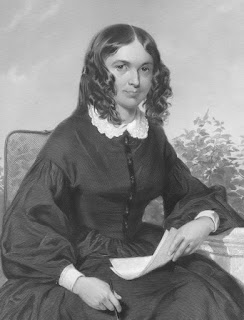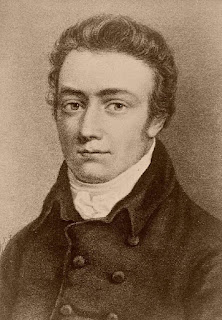Kali ini penulis memilih topik cinta. Cinta tampaknya menjadi sesuatu yang kebanyakan penyair tidak tahu banyak tentangnya. Puisi-puisi yang telah penulis pilih kali ini mencakup keseluruhan spektrum tanggapan terhadap cinta, dari kegembiraan sampai kesedihan, dan kadang-kadang campuran keduanya. Selayaknya topiknya kali ini, daftarnya agak berat pada Romantis dan terang pada tipe pencerahan yang rasional.
"God Speed" by Edmund Leighton
|
Baca juga : Definisi, Penjelasan Serta Contoh "poem, poetry dan Prose" Dalam Bahasa Inggris
Berikut Merupakan 10 Poem / Puisi Bahasa Inggris Terbaik yang Pernah Di Tulis
10. “Since There’s No Help,” by Michael Drayton (1563-1631)
Mungkin ini sebuah pertanda yang buruk untuk memulai dengan sebuah puisi oleh pecundang, tapi memang ada. Drayton, kenalan kontemporer dan mungkin, ternyata telah sampai pada akhir perselingkuhan yang tidak bahagia saat dia menulis sonnet ini. Dia memulai dengan menunjukkan sikap acuh tak acuh: ". . . you get no more of me" tapi itu tidak bisa bertahan lama. Dalam enam baris terakhir, dia menunjukkan perasaan sejatinya dengan serangkaian personifikasi tokoh-tokoh cinta, Passion, Faith, and Innocence yang sekarat, yang dia minta dapat diselamatkan dari nasib mereka dengan kebaikan wanita tersebut.
 |
| Michael Drayton |
Since there’s no help, come let us kiss and part;Nay, I have done, you get no more of me,
And I am glad, yea glad with all my heart
That thus so cleanly I myself can free;
Shake hands forever, cancel all our vows,
And when we meet at any time again,
Be it not seen in either of our brows
That we one jot of former love retain.
Now at the last gasp of Love’s latest breath,
When, his pulse failing, Passion speechless lies,
When Faith is kneeling by his bed of death,
And Innocence is closing up his eyes,
Now if thou wouldst, when all have given him over,
From death to life thou mightst him yet recover.
And I am glad, yea glad with all my heart
That thus so cleanly I myself can free;
Shake hands forever, cancel all our vows,
And when we meet at any time again,
Be it not seen in either of our brows
That we one jot of former love retain.
Now at the last gasp of Love’s latest breath,
When, his pulse failing, Passion speechless lies,
When Faith is kneeling by his bed of death,
And Innocence is closing up his eyes,
Now if thou wouldst, when all have given him over,
From death to life thou mightst him yet recover.
9. “How Do I Love Thee,” by Elizabeth Barrett Browning (1806-1861)
Jika puisi, seperti yang dikatakan Wordsworth, adalah "emosi yang teringat ketenangannya," sonar ini mendapat nilai tinggi pada yang pertama namun tidak sesuai dengan yang terakhir. Elizabeth mungkin telah menjadi groupie seni asli, yang hasratnya terhadap penyair terkenal Robert Browning tampaknya tidak mengenal batasan dan tidak mengenal ekses apapun. Dia mencintai dia mengatakan "with my childhood’s faith," kekasihnya sekarang memegang tempat dia "lost saints.." Tidak heran jika puisi ini, apapun hiperbolanya, telah lama menjadi favorit gadis remaja dan ibu yang ingat seperti apa rasanya.
 |
| Elizabeth Barrett Browning |
How do I love thee? Let me count the ways.
I love thee to the depth and breadth and height
My soul can reach, when feeling out of sight
For the ends of being and ideal grace.
I love thee to the level of every day’s
Most quiet need, by sun and candle-light.
I love thee freely, as men strive for right.
I love thee purely, as they turn from praise.
I love thee with the passion put to use
In my old griefs, and with my childhood’s faith.
I love thee with a love I seemed to lose
With my lost saints. I love thee with the breath,
Smiles, tears, of all my life; and, if God choose,
I shall but love thee better after death.
My soul can reach, when feeling out of sight
For the ends of being and ideal grace.
I love thee to the level of every day’s
Most quiet need, by sun and candle-light.
I love thee freely, as men strive for right.
I love thee purely, as they turn from praise.
I love thee with the passion put to use
In my old griefs, and with my childhood’s faith.
I love thee with a love I seemed to lose
With my lost saints. I love thee with the breath,
Smiles, tears, of all my life; and, if God choose,
I shall but love thee better after death.
8. “Love’s Philosophy,” by Percy Bysshe Shelley (1792-1822)
Terlepas dari gelarnya, puisi enam belas baris yang sangat manis ini tidak ada hubungannya dengan filsafat, sejauh yang saya lihat. Sebagai gantinya, ia mengumumkan salah satu argumen tertua tentang swain kepada seorang pelayan: "Seluruh dunia berada dalam kontak intim - air, angin, gunung, moonbeams, bahkan bunga. Bagaimana dengan Anda? "Karena" Tidak ada satu pun di dunia ini yang lajang, "katanya dengan beberapa contoh," Apa gunanya pekerjaan bagus ini? Jika Anda tidak mencium saya? "Menariknya, bukti seorang kekasih tentang" hukum ilahi "untuk berbaur dengan hati-hati menghilangkan referensi hewan dan perilaku berbaur mereka. Bagaimanapun, saya berharap ini berhasil baginya.
 |
| Percy Bysshe Shelley |
And the rivers with the ocean,
The winds of heaven mix for ever
With a sweet emotion;
Nothing in the world is single;
All things by a law divine
In one spirit meet and mingle.
Why not I with thine?—
See the mountains kiss high heaven
And the waves clasp one another;
No sister-flower would be forgiven
If it disdained its brother;
And the sunlight clasps the earth
And the moonbeams kiss the sea:
What is all this sweet work worth
If thou kiss not me?
7. “Love,” by Samuel Taylor Coleridge (1772-1834)
Di sini kita memiliki usaha lain yang berani untuk melakukan rayuan, yang satu ini lebih lama dan lebih rumit dari pada Shelley. Dalam puisi ini, sang kekasih mencoba untuk mendapatkan keinginannya dengan menarik emosi objeknya yang lembut. Dia menyanyikan lagu tentang masa ksatria, di mana seorang ksatria menyelamatkan seorang wanita dari "kemarahan terburuk daripada kematian" (apapun itu), terluka dan akhirnya meninggal dalam pelukannya. Si penyair tercinta, saat mendengar ceritanya, sangat tergerak untuk menangis dan, untuk membuat ceritanya tidak asalkan yang asli, mengalah.
Seperti puisi yang paling terkenal, "The Rime of the Ancient Mariner," Coleridge menggunakan bentuk bahasa Inggris tertua, bait balada, tapi di sini dia menggunakan garis kedua yang panjang. Coleridge, omong-omong, bisa benar-benar menceritakan kisah romantis, apapun motifnya yang tersembunyi.
Seperti puisi yang paling terkenal, "The Rime of the Ancient Mariner," Coleridge menggunakan bentuk bahasa Inggris tertua, bait balada, tapi di sini dia menggunakan garis kedua yang panjang. Coleridge, omong-omong, bisa benar-benar menceritakan kisah romantis, apapun motifnya yang tersembunyi.
 |
| Samuel Taylor Coleridge |
All thoughts, all passions, all delights,
Whatever stirs this mortal frame,
All are but ministers of Love,
And feed his sacred flame.
Oft in my waking dreams do I
Live o’er again that happy hour,
When midway on the mount I lay,
Beside the ruined tower.
The moonshine, stealing o’er the scene
Had blended with the lights of eve;
And she was there, my hope, my joy,
My own dear Genevieve!
She leant against the arméd man,
The statue of the arméd knight;
She stood and listened to my lay,
Amid the lingering light.
Few sorrows hath she of her own,
My hope! my joy! my Genevieve!
She loves me best, whene’er I sing
The songs that make her grieve.
I played a soft and doleful air,
I sang an old and moving story—
An old rude song, that suited well
That ruin wild and hoary.
She listened with a flitting blush,
With downcast eyes and modest grace;
For well she knew, I could not choose
But gaze upon her face.
I told her of the Knight that wore
Upon his shield a burning brand;
And that for ten long years he wooed
The Lady of the Land.
I told her how he pined: and ah!
The deep, the low, the pleading tone
With which I sang another’s love,
Interpreted my own.
She listened with a flitting blush,
With downcast eyes, and modest grace;
And she forgave me, that I gazed
Too fondly on her face!
But when I told the cruel scorn
That crazed that bold and lovely Knight,
And that he crossed the mountain-woods,
Nor rested day nor night;
That sometimes from the savage den,
And sometimes from the darksome shade,
And sometimes starting up at once
In green and sunny glade,—
There came and looked him in the face
An angel beautiful and bright;
And that he knew it was a Fiend,
This miserable Knight!
And that unknowing what he did,
He leaped amid a murderous band,
And saved from outrage worse than death
The Lady of the Land!
And how she wept, and clasped his knees;
And how she tended him in vain—
And ever strove to expiate
The scorn that crazed his brain;—
And that she nursed him in a cave;
And how his madness went away,
When on the yellow forest-leaves
A dying man he lay;—
His dying words—but when I reached
That tenderest strain of all the ditty,
My faultering voice and pausing harp
Disturbed her soul with pity!
All impulses of soul and sense
Had thrilled my guileless Genevieve;
The music and the doleful tale,
The rich and balmy eve;
And hopes, and fears that kindle hope,
An undistinguishable throng,
And gentle wishes long subdued,
Subdued and cherished long!
She wept with pity and delight,
She blushed with love, and virgin-shame;
And like the murmur of a dream,
I heard her breathe my name.
Her bosom heaved—she stepped aside,
As conscious of my look she stepped—
Then suddenly, with timorous eye
She fled to me and wept.
She half enclosed me with her arms,
She pressed me with a meek embrace;
And bending back her head, looked up,
And gazed upon my face.
‘Twas partly love, and partly fear,
And partly ’twas a bashful art,
That I might rather feel, than see,
The swelling of her heart.
I calmed her fears, and she was calm,
And told her love with virgin pride;
And so I won my Genevieve,
My bright and beauteous Bride.
All are but ministers of Love,
And feed his sacred flame.
Oft in my waking dreams do I
Live o’er again that happy hour,
When midway on the mount I lay,
Beside the ruined tower.
The moonshine, stealing o’er the scene
Had blended with the lights of eve;
And she was there, my hope, my joy,
My own dear Genevieve!
She leant against the arméd man,
The statue of the arméd knight;
She stood and listened to my lay,
Amid the lingering light.
Few sorrows hath she of her own,
My hope! my joy! my Genevieve!
She loves me best, whene’er I sing
The songs that make her grieve.
I played a soft and doleful air,
I sang an old and moving story—
An old rude song, that suited well
That ruin wild and hoary.
She listened with a flitting blush,
With downcast eyes and modest grace;
For well she knew, I could not choose
But gaze upon her face.
I told her of the Knight that wore
Upon his shield a burning brand;
And that for ten long years he wooed
The Lady of the Land.
I told her how he pined: and ah!
The deep, the low, the pleading tone
With which I sang another’s love,
Interpreted my own.
She listened with a flitting blush,
With downcast eyes, and modest grace;
And she forgave me, that I gazed
Too fondly on her face!
But when I told the cruel scorn
That crazed that bold and lovely Knight,
And that he crossed the mountain-woods,
Nor rested day nor night;
That sometimes from the savage den,
And sometimes from the darksome shade,
And sometimes starting up at once
In green and sunny glade,—
There came and looked him in the face
An angel beautiful and bright;
And that he knew it was a Fiend,
This miserable Knight!
And that unknowing what he did,
He leaped amid a murderous band,
And saved from outrage worse than death
The Lady of the Land!
And how she wept, and clasped his knees;
And how she tended him in vain—
And ever strove to expiate
The scorn that crazed his brain;—
And that she nursed him in a cave;
And how his madness went away,
When on the yellow forest-leaves
A dying man he lay;—
His dying words—but when I reached
That tenderest strain of all the ditty,
My faultering voice and pausing harp
Disturbed her soul with pity!
All impulses of soul and sense
Had thrilled my guileless Genevieve;
The music and the doleful tale,
The rich and balmy eve;
And hopes, and fears that kindle hope,
An undistinguishable throng,
And gentle wishes long subdued,
Subdued and cherished long!
She wept with pity and delight,
She blushed with love, and virgin-shame;
And like the murmur of a dream,
I heard her breathe my name.
Her bosom heaved—she stepped aside,
As conscious of my look she stepped—
Then suddenly, with timorous eye
She fled to me and wept.
She half enclosed me with her arms,
She pressed me with a meek embrace;
And bending back her head, looked up,
And gazed upon my face.
‘Twas partly love, and partly fear,
And partly ’twas a bashful art,
That I might rather feel, than see,
The swelling of her heart.
I calmed her fears, and she was calm,
And told her love with virgin pride;
And so I won my Genevieve,
My bright and beauteous Bride.
Baca juga : Contoh Poem Lama Bahasa Inggris.
6. “A Red, Red Rose,” by Robert Burns (1759-1796)
Puisi paling terkenal Burns 'Auld Lang Syne' adalah pernyataan sederhana tentang perasaan. "How beautiful and delightful is my love," katanya. "You are so lovely, in fact, that I will love you to the end of time. And
even though we are parting now, I will return, no matter what. "Semua ini diungkapkan dengan kelebihan metafora yang menakjubkan:" “And I will love thee still, my dear, / Till a’ the seas gang dry." Puisi tidak memiliki rekan sebagai seruan sederhana seorang pemuda yang tidak mengenal batas.
 |
| Robert Burns |
That’s newly sprung in June;
O my Luve is like the melody
That’s sweetly played in tune.
So fair art thou, my bonnie lass,
So deep in luve am I;
And I will luve thee still, my dear,
Till a’ the seas gang dry.
Till a’ the seas gang dry, my dear,
And the rocks melt wi’ the sun;
I will love thee still, my dear,
While the sands o’ life shall run.
And fare thee weel, my only luve!
And fare thee weel awhile!
And I will come again, my luve,
Though it were ten thousand mile.
5. “Annabell Lee,” by Edgar Allan Poe (1809-1849)
Puisi menunjukkan bakatnya yang luar biasa dalam manipulasi suara bahasa di sini, mungkin sajaknya yang paling terkenal setelah "The Raven." Ini adalah festival efek pendengaran, dengan campuran anambel dan iambs yang menyenangkan, sajak, pengulangan, assonances internal. Ceritanya sendiri adalah favorit Poe, kematian tragis seorang gadis yang cantik dan dicintai, meninggal dunia setelah "sanak keluarga kelahirannya" memisahkannya dari kekasihnya.
 |
| Edgar Allan Poe |
That a maiden there lived whom you may know
By the name of Annabel Lee;
And this maiden she lived with no other thought
Than to love and be loved by me.
I was a child and she was a child,
In this kingdom by the sea:
But we loved with a love
that was more than love—
I and my Annabel Lee;
With a love that the winged seraphs of heaven
Laughed loud at her and me.
And this was the reason that, long ago,
In this kingdom by the sea,
A wind blew out of a cloud, chilling
My beautiful Annabel Lee;
So that her highborn kinsman came
And bore her away from me,
To shut her up in a sepulchre
In this kingdom by the sea.
The angels, not half so happy in heaven,
Went laughing at her and me—
Yes!—that was the reason (as all men know,
In this kingdom by the sea)
That the wind came out of the cloud by night,
Chilling and killing my Annabel Lee.
But our love it was stronger by far than the love
Of those who were older than we—
Of many far wiser than we—
And neither the laughter in heaven above,
Nor the demons down under the sea,
Can ever dissever my soul from the soul
Of the beautiful Annabel Lee:
For the moon never beams, without bringing me dreams
Of the beautiful Annabel Lee;
And the stars never rise, but I feel the bright eyes
Of the beautiful Annabel Lee;
And so, all the night-tide, I lie down by the side
Of my darling—my darling—my life and my bride,
In her sepulchre there by the sea,
In her tomb by the sounding sea.
4. “Whoso List to Hunt,” by Sir Thomas Wyatt (1503-1542)
Ditujukan dan ditulis tentang Anne Boleyn, istri Raja Henry VIII, puisi pahit ini membandingkan kekasihnya dengan seekor rusa yang melarikan diri sebelum pemburu yang kelelahan, yang akhirnya menyerah mengejar, karena, seperti yang dia katakan, "in a net I seek to hold the wind. " Selain itu, dia mencerminkan, dia adalah milik raja, dan dilarang pula. Kepahitan datang terutama di baris pertama: “I know where there is a female deer, if anyone wants to go after her." Beberapa kosa kata yang lebih sulit diterjemahkan di bawah ini. Seiring berjalannya sejarah, dia tidak dapat menghasilkan pewaris laki-laki yang diinginkan Henry dan dia (mungkin) secara salah menuduh dia melakukan inses dan perzinahan agar dia bisa membebaskannya. Cinta ini, yang dibajak oleh kekuatan yang lebih tinggi, sangat sulit dipahami, dan sangat menggoda sangat nyata dan menarik.
 |
| Sir Thomas Wyatt |
The vain travail hath wearied me so sore,
I am of them that farthest cometh behind.
Yet may I by no means my wearied mind
Draw from the deer, but as she fleeth afore
Fainting I follow. I leave off therefore,
Since in a net I seek to hold the wind.
Who list her hunt, I put him out of doubt,
As well as I may spend his time in vain.
And graven with diamonds in letters plain
There is written, her fair neck round about:
“Noli me tangere, for Caesar’s I am,
And wild for to hold, though I seem tame.”
Whoso list: whoever wants
Hind: Female deer
Noli me tangere: “Don’t touch me”
Hind: Female deer
Noli me tangere: “Don’t touch me”
3. “To His Coy Mistress,” by Andrew Marvell (1621-1678)
Si kekasih mencoba untuk meyakinkan seorang wanita yang enggan ('malu-malu') untuk menyetujui pemasukannya, bukan dengan cerita sedih, seperti dalam puisi Coleridge, atau oleh seruan terhadap alam, seperti juga di Shelley, namun dengan argumen formal: Seksualitas berakhir dengan kematian, yang tak terelakkan, jadi apa yang Anda simpan untuk itu?
Ini adalah salah satu dari sepuluh puisi terbaik dalam bahasa Inggris, jadi saya akan memasukkannya ke sini, apakah bisa disematkan dengan label seperti cinta atau kematian atau tidak.
 |
| Andrew Marvell |
We would sit down, and think which way
To walk, and pass our long love’s day.
Thou by the Indian Ganges’ side
Shouldst rubies find; I by the tide
Of Humber would complain. I would
Love you ten years before the flood,
And you should, if you please, refuse
Till the conversion of the Jews.
My vegetable love should grow
Vaster than empires and more slow;
An hundred years should go to praise
Thine eyes, and on thy forehead gaze;
Two hundred to adore each breast,
But thirty thousand to the rest;
An age at least to every part,
And the last age should show your heart.
For, lady, you deserve this state,
Nor would I love at lower rate.
But at my back I always hear
Time’s wingèd chariot hurrying near;
And yonder all before us lie
Deserts of vast eternity.
Thy beauty shall no more be found;
Nor, in thy marble vault, shall sound
My echoing song; then worms shall try
That long-preserved virginity,
And your quaint honour turn to dust,
And into ashes all my lust;
The grave’s a fine and private place,
But none, I think, do there embrace.
Now therefore, while the youthful hue
Sits on thy skin like morning dew,
And while thy willing soul transpires
At every pore with instant fires,
Now let us sport us while we may,
And now, like amorous birds of prey,
Rather at once our time devour
Than languish in his slow-chapped power.
Let us roll all our strength and all
Our sweetness up into one ball,
And tear our pleasures with rough strife
Through the iron gates of life:
Thus, though we cannot make our sun
Stand still, yet we will make him run.
2. “Bright Star,” by John Keats (1795-1821)
Keats membawa sensualitas yang hampir luar biasa ke puisi ini. Anehnya, delapan baris pertama bukan tentang cinta atau bahkan kehidupan manusia; Keats melihat bintang yang dipersonifikasikan (Venus? Tapi tidak teguh. Bintang Utara? Ini tabah tapi tidak terlalu terang.) Apa pun bintangnya, sestet menemukan kekasihnya "Bantal di atas payudara saya yang cantik," di mana dia berencana untuk tinggal selamanya, atau setidaknya sampai mati. Entah bagaimana, penjajaran yang mengejutkan dari pemandangan bumi yang luas seperti yang terlihat dari langit dan gambaran intim para pecinta bekerja untuk menginvestasikan tempat hiburan dengan kepentingan kosmik. John Donne kadang-kadang menyelesaikan efek yang sama ini, meski tidak ada puisinya yang membuat keputusan terakhir saya.
Bright star, would I were stedfast as thou art—
 |
| John Keats |
Not in lone splendour hung aloft the night
And watching, with eternal lids apart,
Like nature’s patient, sleepless Eremite,
The moving waters at their priestlike task
Of pure ablution round earth’s human shores,
Or gazing on the new soft-fallen mask
Of snow upon the mountains and the moors—
And watching, with eternal lids apart,
Like nature’s patient, sleepless Eremite,
The moving waters at their priestlike task
Of pure ablution round earth’s human shores,
Or gazing on the new soft-fallen mask
Of snow upon the mountains and the moors—
No—yet still stedfast, still unchangeable,
Pillow’d upon my fair love’s ripening breast,
To feel for ever its soft fall and swell,
Awake for ever in a sweet unrest,
Still, still to hear her tender-taken breath,
And so live ever—or else swoon to death.
1. “Let Me Not to the Marriage of True Minds” (Sonnet 116), by William Shakespeare (1564-1616)
Puisi ini bukanlah daya tarik pribadi melainkan definisi universal tentang cinta, yang oleh penyairnya didefinisikan sebagai konstan dan tidak dapat diubah dalam menghadapi keadaan apapun. Ini seperti Bintang Utara, katanya, yang, bahkan jika kita tidak tahu lagi tentang hal itu, kita tahu di mana tempatnya, dan hanya itu yang kita butuhkan. Bahkan kematian pun tidak bisa menguasai dirinya sendiri atas cinta, yang bertahan sampai akhir zaman itu sendiri. Bait terakhir menegaskan kembali komitmennya:
If this be error and upon me proved,
I never write, nor no man ever loved.
Masalahnya adalah jika Shakespeare benar tentang keteguhan cinta, maka tidak ada puisi lain dalam daftar ini yang akan ditulis, atau kalau tidak, mereka sama sekali bukan tentang cinta. Tampaknya Shakespeare mungkin sedang membicarakan lapisan cinta yang lebih dalam, melampaui daya tarik sensual dan keintiman, sesuatu yang lebih mirip dengan belas kasihan atau kebajikan bagi sesama Anda. Dalam wahyu tentang sifat kekuatan semacam itu, yang darinya cinta itu berasal, terletak kejeniusan Shakespeare.
If this be error and upon me proved,
I never write, nor no man ever loved.
Masalahnya adalah jika Shakespeare benar tentang keteguhan cinta, maka tidak ada puisi lain dalam daftar ini yang akan ditulis, atau kalau tidak, mereka sama sekali bukan tentang cinta. Tampaknya Shakespeare mungkin sedang membicarakan lapisan cinta yang lebih dalam, melampaui daya tarik sensual dan keintiman, sesuatu yang lebih mirip dengan belas kasihan atau kebajikan bagi sesama Anda. Dalam wahyu tentang sifat kekuatan semacam itu, yang darinya cinta itu berasal, terletak kejeniusan Shakespeare.
 |
| William Shakespeare |
Let me not to the marriage of true minds
Admit impediments.
Love is not love Which alters when it alteration finds,
Or bends with the remover to remove.
O no! it is an ever-fixed mark
That looks on tempests and is never shaken;
Or bends with the remover to remove.
O no! it is an ever-fixed mark
That looks on tempests and is never shaken;
It is the star to every wand’ring bark,
Whose worth’s unknown, although his height be taken.
Love’s not Time’s fool, though rosy lips and cheeks
Within his bending sickle’s compass come;
Love alters not with his brief hours and weeks,
But bears it out even to the edge of doom.
If this be error and upon me proved,
I never writ, nor no man ever loved.
